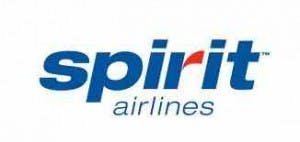
The comforting fact about many of these charges, if there is one, is that they’re usually optional. You don’t have to buy a $3 bottle of water from Spirit Airlines Incorporated (NASDAQ:SAVE) or pay $17 to $25 for a pillow and blanket from Allegiant Travel Company (NASDAQ:ALGT) if you don’t want to — and they’re often confined to a single airline. However, one charge is slowly infiltrating the sector that may soon become commonplace and promises to be a game-changer — namely, the carry-on baggage fee.
Source: Commons.wikimedia.org.
Charrrrrrrrrge!
Spirit Airlines Incorporated (NASDAQ:SAVE) began charging customers for carry-on bags in 2010 as part of its campaign to undercut regional and national carriers with ultra-low ticket prices and allow consumers to add optional items at their discretion (baggage, carry-on baggage, food and drinks, etc.) to drive its margins. Spirit Airlines Incorporated (NASDAQ:SAVE) learned quickly that these ancillary fees, which it typically discounts if they’re booked online, or in some cases even at the airport’s point-of-sale machines, rarely require a physical airline representative for collection purposes, making them beefy margin boosters. Spirit Airlines Incorporated (NASDAQ:SAVE) later upped its carry-on fee to as much as $100 for customers who wait to check their bag at the gate.
Allegiant Travel Company (NASDAQ:ALGT) followed suit in April of last year, announcing a plan to charge $30 for carry-on bags that were booked online, and also adding a surcharge for bags booked at the airport.
On Wednesday, Republic Airways Holdings Inc. (NASDAQ:RJET) -owned Frontier Airlines announced that it, too, plans to join the carry-on-bag-charging club. However, Frontier’s carry-on baggage charge, which will range from $25 to $100, is unique in that it doesn’t slap every customer with the charge as Spirit Airlines Incorporated (NASDAQ:SAVE) and Allegiant Travel Company (NASDAQ:ALGT) currently do. Instead, carry-on bags will remain free for customers who book their flights through Frontier, but an added charge will apply for customers who book their flight through third-party websites such as Expedia Inc (NASDAQ:EXPE) and Orbitz Worldwide, Inc. (NYSE:OWW) which typically offer cheaper flight prices than what you’ll find on airline companies’ websites.
 Source: Commons.wikimedia.org.
Source: Commons.wikimedia.org.
“A whole different animal”
Frontier’s move is groundbreaking for two particular reasons.
First, it adds yet another airline to those charging for carry-on bags. Spirit Airlines Incorporated (NASDAQ:SAVE) and Allegiant Travel Company (NASDAQ:ALGT) are writing the book on utilizing high-margin optional fees to drive bottom-line growth, and other regional airlines appear likely to catch onto this growth-driver. Either that or they will simply be left behind.
Second, it could put third-party booking sites in a bind. The advantage of third-party sites such as Expedia and Orbitz Worldwide, Inc. (NYSE:OWW) is that they usually undercut airlines’ website ticket prices and allow users to bundle their flight with other items like a car and hotel to maximize their savings. However, if airlines suddenly begin penalizing passengers who purchase their ticket through these third-party websites by imposing carry-on baggage fees, if the math makes sense, they’ll simply make their purchase via the airlines’ website.
But before you panic …
If you’re suddenly frantic to click the “sell” button on third-party travel sites, consider this point: While airline tickets make up a big chunk of travel sites’ gross bookings, it’s hotels that provide the biggest margin boost. Since competition among airlines is fiercely competitive, and most airline websites are introducing travel prices that are somewhat competitive with Expedia Inc (NASDAQ:EXPE) and Orbitz Worldwide, Inc. (NYSE:OWW), margins tend to be low in airline bookings. Third-party travel sites make the bulk of their profits from hotel bookings, which are far less transparent to consumers, making it easier for them to charge a premium. This move may actually have less bearing on the third-party booking sector than you might think.
For airlines, though, it could have a big benefit. As I said, these fees are almost pure profit with little need to add representatives for collection purposes. Don’t be surprised if you see a wider adoption of carry-on baggage fees — at least in the sense of being directed at customers making purchases through third-party websites — by regional airlines in the coming year.
The article Is This Outlandish Airline Fee a Game-Changer? originally appeared on Fool.com and is written by Sean Williams.
Fool contributor Sean Williams has no material interest in any companies mentioned in this article. You can follow him on CAPS under the screen name TMFUltraLong, track every pick he makes under the screen name TrackUltraLong, and check him out on Twitter, where he goes by the handle @TMFUltraLong.The Motley Fool owns shares of Spirit Airlines.
Copyright © 1995 – 2013 The Motley Fool, LLC. All rights reserved. The Motley Fool has a disclosure policy.
